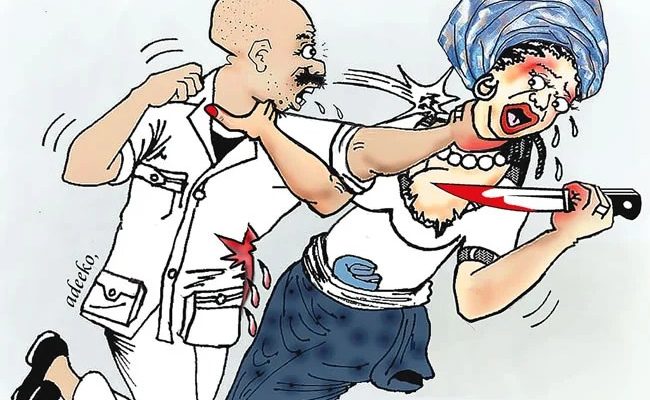
Marriage is often portrayed as a partnership built on love, respect, and companionship. However, for many women, this ideal relationship remains a distant dream. In this report, IFEDAYO OGUNYEMI, VINCENT KURAUN and YETUNDE AJANAKU examine the experiences of victims of spousal abuse and how they cope.
SPOUSAL abuse has grown to become a pervasive issue often hidden behind closed doors that shatters the illusion of many happy marriages, leaving victims trapped in a cycle of terror and despair.

This form of violence perpetrated against a partner is not just about physical violence, but also a terrifying reality for many. It’s a spectrum of abuse that can manifest in myriad ways. From emotional manipulation and verbal assaults to financial control and threats, the abuser seeks to exert power and dominance, leaving the victim feeling isolated, worthless, and powerless.
Spousal abuse has since remained one of the many problems Nigeria continues to grapple with today and it stems from the country’s long-standing problem with domestic violence.
The struggle with domestic violence was one of the many reasons that prompted the government to take action in 2015 when former President Goodluck Jonathan signed the Violence Against Persons Prohibition (VAAP) Act into law.
A 2022 news report quoting data sourced from the VAPP tracker set up by Rule of Law and Empowerment Initiative noted that 21 states have domesticated the VAPP Act, while 15 states — most of which are in the north — are yet to pass the bill into law.
The landmark legislation was aimed to create a comprehensive legal framework to protect vulnerable individuals, particularly women and girls, from all forms of violence, including physical, sexual, psychological, domestic abuse, and harmful traditional practices.
The VAAP Act specifically criminalises domestic violence, including spousal abuse, with penalties of up to three years imprisonment and a fine of N200,000 for persons who commit the act of violence against their spouses. Anyone who attempts to commit such crime is liable to face up to a year imprisonment or fine N100,000 or both. The law also aims to combat discrimination, provide support and remedies for victims, and ensure punishment for perpetrators.
Despite these legal measures, domestic violence remains a pervasive issue in Nigeria. Incidents range from battery and beatings to torture, acid attacks, rape, and even death. Shockingly, an estimated one in three women in Nigeria experiences domestic violence, according to the Nigeria Demographic Health Survey (NDHS 2013). This epidemic is fueled by a culture of silence, where victims often face indifference, insensitivity, and negative responses from their families and communities, hindering them from seeking help.
While quoting data from the NDHS in 2018 and Nigeria’s National Population Commission in 2019, a 2020 study published by the BioMed Central Ltd showed that a staggering 69 percent of women reported experiencing physical, sexual, or emotional violence by a partner in Nigeria.
The global picture paints an equally grim picture. Worldwide, an estimated 736 million women (almost one in three) have experienced physical or sexual violence by an intimate partner, according to the United Nations. This is just as intimate partner violence is responsible for 38 percent of all murders where women are victims.
The ugly reality is that this complex issue shrouded in secrecy and shame doesn’t manifest immediately in most cases and it transcends socio-economic barriers, targeting individuals from all walks of life.
Despite growing awareness and advocacy against domestic violence, countless women remain in toxic marriages, unable to break free due to societal pressures, financial constraints, and concern for their children. While some endure in silence, others take the bold step of walking away.
What many envision when seeing photographs of couples in the love and the beautiful aura that sometimes permeates the atmosphere, but when that perfect picture shatters, it reveals a terrifying truth of fear, control, and violence
One of the victims of such, Yetunde, a prisoner in her own home, began her story with a bittersweet recollection. “Our wedding was a beautiful moment, filled with promise. As we walked down the aisle, I felt a profound sense of peace, believing we were embarking on a lifelong journey together.
“The congregation, witnessing the radiant love Adekunle and I shared, felt the warmth of our connection. This warmth fueled my certainty that our future was filled with promise, a future where love and joy would blossom.
“As we stood before the priest, our hands clasped, a symbol of our unwavering commitment, we were poised to exchange vows. Our hearts brimmed with anticipation for the momentous occasion, ready to pledge our love for eternity. This was the start of our forever, a journey we were embarking on together, filled with joy and hope.”
Speaking further to Sunday Tribune, Yetunde described the initial instance of abuse: “I was completely shocked when he first struck me. He immediately apologised and promised it wouldn’t happen again.
“The situation began to unravel after we started having children. Adekunle, who held a managerial position in a reputable organisation, began to indulge in infidelity, and he did so openly without any regard for me.
“In my presence, he would take calls from his other women while getting ready to meet them, often leaving his wedding ring behind. Whenever I tried to confront him about it, I was met with severe physical abuse. I couldn’t turn to my parents for help, as they disapproved of my decision to marry him in the first place.
“The emotional trauma became overwhelming, and eventually, I reached a breaking point. I chose to focus on raising our children and starting a business with the support of my family. However, the abuse persisted.
“As the years passed, he lost his job and gradually began to neglect his responsibilities, leaving me to care for the children on my own. Despite attempts from his family to guide him towards various business opportunities, he wasted the funds instead.
“His jealousy toward me intensified, and he began to show hostility toward the children as well, resenting their closeness to me.
“But how can you expect the kids to love you when you are constantly abusing their mother in front of them?
“My primary reason for staying in this marriage has been my children. I’ve always put their needs first, even at the cost of my own well-being. While the physical abuse has reduced as the kids grew older, the emotional scars and trauma from the past remain.”
Speaking in the same vein, Mrs Esther Komolafe, who is in her late thirties, has spent years enduring emotional abuse from her husband. Despite the pain, she remains in the marriage—not because she wants to, but because she feels she has no other option.
“My parents warned me never to return home,” she explained, her voice laced with resignation. “No matter what I face in my marriage, I have been told to endure it. Where do I go if I leave?”
For Mrs Komolafe, the pressure from her family presents a significant barrier to leaving her husband, but it is not the only one. Financial stability is another major factor. “If I had my own means of survival, I wouldn’t be here,” she said.
Many women find themselves in similar situations and without financial independence, they feel powerless to make decisions that could secure their safety and well-being and their children, who play a big role in their decision to stay in abusive marriages.
“I can’t just leave,” Mrs Komolafe said. “My children need me. If I walk away, what happens to them?”
This is a reality for many women—choosing between their own mental and physical health and the welfare of their children.
Another victim, Mrs Amaka Godson, had endured years of physical abuse at the hands of her husband before making the difficult decision to leave. That decision, she said, was one of the hardest ones she has taken in her life.
“For years, I believed things would change,” she recalled. “He would apologise after hitting me, and I would convince myself that maybe he didn’t mean it or that maybe I had provoked him. But the truth is, no woman deserves to be hit, no matter the excuse.”
Eventually, the physical abuse became unbearable. “The last time he hit me, I knew I had to leave, or I wouldn’t survive the next time. I packed my things and walked out. It was one of the hardest things I’ve ever done, but it was also the best decision I made for myself,” Mrs Godson said.
She now lives alone and free from the violence that once defined her marriage. While she acknowledged the challenges of being single again, she insisted that nothing is worse than being trapped in an abusive home.
“People say marriage is for better or worse, but should that ‘worse’ mean losing yourself?” she queried. “I would rather stay alone than with a man who destroys me, physically or emotionally.”
One of the misconceptions about abusive marriages is that as long as a man provides financially, other forms of abuse should be overlooked. This belief keeps many women in toxic relationships, suffering in silence because their husbands are seen as “good providers.” But Mrs Godson dismissed this mindset.
“A man can be a provider materially but choose to be abusive in other aspects. Just because he puts food on the table doesn’t mean he has the right to break you emotionally, physically, or mentally. That is not love,” she asserted.
While acknowledging she hasn’t personally experienced abuse in her own marriage, Sandra, a resident of Port Harcourt, Rivers State, believes that women who remain in such relationships often have underlying reasons for doing so, drawing from her sister’s harrowing experience.
“Despite the abuse, she remains in the relationship because the man has not yet paid her bride price. Other family members and I have tried to convince her to leave, but she has been reluctant.
“Despite having a daughter, my sister continued to suffer abuse from the man but she is still hoping that having a son would change his behaviour. However, the thought of what might happen to her if he finally paid her bride price is unsettling. Ultimately, it’s her choice; she’s an adult capable of making her own decisions,” Sandra said.
Speaking on the issue, an expert and convener, Domestic Violence Anonymous (DVA), Dr Efe Anaughe, called on families and members of victims and survivors to be more empathetic to them and their experiences, urging people not to judge, condemn or blame them but to put themselves in their positions.
She observed that most of the abused persons horridly leave their homes, relationship or marriage without a plan B or exit plan, some leave without their documents, schools’ certificates, money or clothes, while others leave with children without a viable source of income to cater for themselves and children, so they become liabilities to their extended families, friends and the society.
“However, it is really very tough out there, because unfortunately these extended persons also have their own personal and family issues,” she said.

17,415 gender violence cases reported in 2024 —Police
Giving a breakdown of cases treated in the 2024 calendar year, the Nigeria Police Force said it attended to no fewer than 17,415 cases of gender and domestic-based violence in 2024, adding that it secured 409 convictions in the 15,692 cases that were charged in court.
Speaking during a webinar organised by the Wole Soyinka Centre for Investigative Journalism and Innocent Chukwuemeka Chukwuma Empowerment Foundation last Thursday, Force Public Relations Officer, Olumuyiwa Adejobi, disclosed that despite the number of reported cases, the majority of gender and domestic violence were unreported.
He said, “With the 17,415 cases reported, which means we have some incidences that were never reported, we can only have an accurate figure by encouraging survivors’ relations to come forward to incident some of these cases because if we do not have an accurate figure recorded, we may not be able to have a proper evaluation of these incidences and the way to forge ahead or reviewing some of our laws.
“Out of the cases reported, 15,692 were charged to court while others are still under investigation. Convicted cases are 409 in 2024. As you can see, the figure is too small because if we charge 15,692 to court and we only get 409 convictions, this means that the legal procedure could be so slow which is part of the challenges that we need to collectively address.
“We see families of survivors going to court to file a motion that they don’t have interest in pursuing the case because the suspect is my brother’s uncle, he is my family and so on. Nigerians allowed our cultural values to override our legal framework.”
Also speaking at the webinar, the Executive Secretary of the Lagos State Domestic Domestic and Sexual Violence Agency, Titilayo Vivour-Adeniyi, called for holistic training of law enforcement officers involved in gender violence cases, adding that a cordial relationship between the Director of Public Prosecution (DPP) and the police prosecutors will aid successful prosecution of offenders.
“It is important for the DPP and the police prosecutors to be in a more symbiotic relationship because this will lead to successful prosecution in the future.
“The call to action is to ensure that justice is truly served. A robust investigative process must be at the forefront of our efforts to combat gender-based violence. This requires enhanced training and resources.
“Law enforcement investigative teams must be equipped with specialised training and resources necessary to handle these cases,” she said.
READ ALSO: Terrible cases of spousal violence








